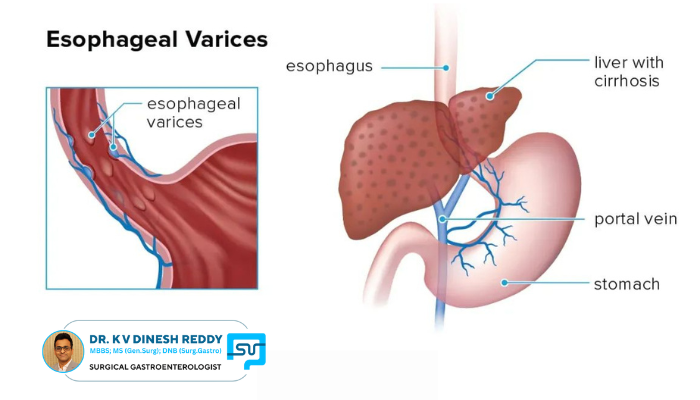Best Esophageal Varices Treatment in Hyderabad
Esophageal varices are swollen veins in the lower part of the food pipe (esophagus). They usually happen because of liver problems or high pressure in the veins around the liver (portal hypertension). If these veins burst, they can cause heavy bleeding, which can be life-threatening. That’s why getting the right care at the right time is so important.
If you are searching for the best esophageal varices treatment in Hyderabad, Dr. K V Dinesh Reddy is here to help. He is a trusted surgical gastroenterologist with years of experience in treating complex digestive and liver-related conditions. From early diagnosis to managing risks and preventing bleeding, his care plan focuses on patient safety, comfort, and long-term recovery.

What Are Esophageal Varices?
Esophageal varices are enlarged veins in the food pipe (esophagus). They usually happen when there is high pressure in the portal vein, which carries blood to the liver. This pressure builds up due to liver problems, often cirrhosis.
These swollen veins are very delicate and can burst, causing serious internal bleeding. Because of this, esophageal varices need regular monitoring and proper treatment to prevent life-threatening complications.
Common Esophageal Varices Symptoms
Esophageal varices typically don’t show symptoms until they rupture. But sometimes, your body may give early warnings.
- Vomiting blood (hematemesis)
- Black or tarry stools
- Feeling dizzy or faint
- Signs of liver disease (jaundice, fatigue, fluid buildup)
If you are experiencing any of these esophageal varices symptoms, it is important to seek immediate medical attention.
What Causes Esophageal Varices?
The most common causes of esophageal varices include:
- Liver cirrhosis (due to alcohol, hepatitis, or fatty liver)
- Portal hypertension – increased blood pressure in the portal vein system
- Blood clots in the portal vein
- Schistosomiasis (a parasitic infection in some parts of the world)
Addressing the root cause is crucial for long-term control of esophageal varices.
How Are Esophageal Varices Diagnosed?
For accurate esophageal varices diagnosis, the following tests are commonly used:
- Upper GI Endoscopy – the most effective way to view swollen veins in the esophagus
- Imaging tests – such as ultrasound or CT scans to evaluate liver and vein condition
- Blood tests – to assess liver function and detect signs of bleeding or anemia
Early diagnosis plays a key role in preventing life-threatening complications.
Treatment Options for Esophageal Varices
The main aim of treating esophageal varices is to stop bleeding and manage liver problems that may be causing it. Based on how serious the condition is, doctors may use one or more of the following methods:
Endoscopic Therapy
- Endoscopic Variceal Ligation (EVL): Small rubber bands are placed around the swollen veins to stop or prevent bleeding.
- Sclerotherapy: A special liquid is injected into the veins to make them shrink and reduce the risk of bleeding.
Medications
- Non-selective beta-blockers to reduce portal pressure
- Vasoactive drugs during bleeding episodes to control hemorrhage
Advanced Procedures
- TIPS (Transjugular Intrahepatic Portosystemic Shunt): A minimally invasive procedure where doctors create a new channel in the liver to help blood flow better and lower the pressure in the portal vein.
Liver Transplant Evaluation
- If someone has serious liver damage and keeps having bleeding problems, doctors may need to check if a liver transplant is the right option.
Treatment choice depends on bleeding risk, liver function, and other co-existing conditions. Regular monitoring is also critical to prevent recurrence.
Why Choose Dr. K V Dinesh Reddy for Esophageal Varices?
- Over 10 years of experience handling GI bleeding and liver problems
- Expert in both endoscopic and surgical treatment for esophageal varices
- Gives care that’s focused on what’s best for each patient
- Works closely with liver doctors, radiologists, and diet experts
- Offers quick diagnosis, less invasive treatments, and ongoing support
When it comes to treating esophageal varices, the right doctor can make all the difference. Dr. Dinesh Reddy gives every patient the attention and care they truly need at the right time.
Take Control of Your Health – Book Your Appointment Today
Esophageal varices don’t always give a second chance. If you or someone you care about has liver disease or signs of GI bleeding, get help from the best esophageal varices treatment specialist in Hyderabad.
📞 Call: +91 9390836659
Frequently Asked Questions
Can esophageal varices be cured permanently?
Esophageal varices can’t be permanently cured, but treatments like EVL, medications, and managing liver disease can reduce bleeding risk and prevent complications effectively.
What foods should be avoided with esophageal varices?
Avoid spicy foods, hard-to-chew items, and alcohol. Soft, nutritious meals help prevent irritation and reduce pressure on the esophagus, supporting varices management.
How often should esophageal varices be monitored?
If you have liver cirrhosis or portal hypertension, doctors usually recommend an endoscopy every 6 to 12 months to monitor esophageal varices and prevent sudden bleeding.
What is the life expectancy after esophageal varices treatment?
Life expectancy depends on liver health and treatment response. With early diagnosis and proper esophageal varices management, many patients lead stable and longer lives.
What are the complications of esophageal varices if left untreated?
If untreated, esophageal varices can rupture, causing severe internal bleeding, anemia, shock, or even death. Regular monitoring and timely treatment reduce these life-threatening complications.
Who is the best doctor for esophageal varices treatment in Hyderabad?
Dr. K V Dinesh Reddy is known for offering the best esophageal varices treatment in Hyderabad, with expertise in endoscopy, GI bleeding management, and liver-related conditions. Book appointment now.
